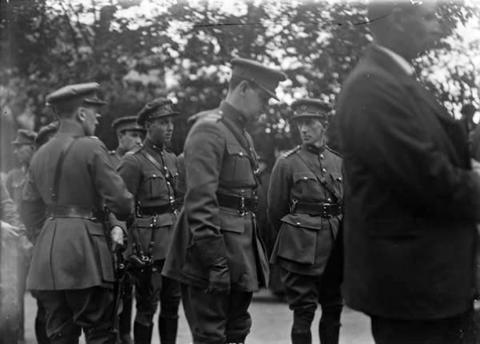Collins might well wonder at Kenny's sorry State

In so far as we can imagine what Michael Collins might have wished for, it is likely he would wonder what the struggle for independence was about, since we have given away so much of it, so casually. By Vincent Browne.
Michael Collins, one of the founders of the State, was assassinated 90 years ago today at Béal na Blá. Because at the time of his death he was the driving force in the newly independent Ireland, and because of his central role in the War of Independence, and his relative youth (aged 31) at the time of his death, he has become a cult figure. His extraordinary energy, his organisational abilities, and his charisma remain celebrated. Less acknowledged are serious misgivings concerning him.
Those misgivings arise in the main from his involvement in the secret oath-bound Irish Republican Brotherhood (the IRB). He had become president of that organisation in the summer of 1919 and, in the ideology of that movement, thereby had become “President of the Irish Republic”; outside the ambit of the new State he had been instrumental in creating.
He used that position secretly to win control of the IRA during the War of Independence and he continued to use that role to wage a secret war on the new entity, Northern Ireland, that had been created almost simultaneously with the emergence of the new Irish State. In so doing he was acting behind the backs of his closest colleagues, including Arthur Griffith and WT Cosgrave.
A historian, John Regan, now of Dundee University, has claimed: “The reorganisation of the Brotherhood was part of Collins’s desire to centralise power in himself. He had taken over military power at his own request, becoming Commander-in-Chief of the army at the beginning of July.
“At the same time he remained firmly in control of the civil government with Cosgrave acting as his deputy-cum-amanuensis in the cabinet… All sources of power led back to Collins within the regime… With Griffith’s death on August 12th (1922) and with no parliament to account to, Collins, for better or worse, assumed dictatorial powers within the new regime.”
Martin Mansergh, the historian and former Fianna Fáil minister for State, has said: “It is unfortunately wishful thinking to present Collins as someone who had definitely decided that force vis-á-vis the North had had its day.”
Martin Mansergh noted that Collins was at best ambiguous about how Protestants would fit into the new independent State. He said of that new State: “We are now free in name. The extent to which we become free in fact and secure our freedom will be the extent to which we become Gaels again.”
In his last speech in Dáil Éireann, Michael D Higgins said Michael Collins had been dismissive of the much-heralded Democratic Programme of the first Dáil, which envisaged a society founded on solidarity and equality.
Michael D said Collins had said that programme had been merely a sop to the Labour Party in 1919 and nobody should pay any attention to it.
Enda Kenny was this year’s orator at the annual commemoration ceremony at Béal na Blá last Sunday and he engaged in the usual acclaim of the “fallen hero” – to be fair to Enda that was a cliché he avoided. Michael Collins, he said, was “a reformer, a thinker, a moderniser (who would have been) pro-Europe”, “brilliant minister for finance”, “thoughtful”, “disciplined”. And an extraordinary claim: “The outstanding organiser who brought Lenin himself to Ireland to see how the National Loan worked.” Lenin was never in Ireland.
Enda went on to use the occasion to talk about how another heroic figure had done and was doing great things for Ireland: himself.
He said: “I refuse to allow what is in reality a temporary, hand-me-down financial straitjacket, damage what will be a magnificent future for our country, for our people and for our children’s children,” by which I think he meant he won’t allow the EU, ECB and IMF programme to damage our future.
But doesn’t he take credit for adhering meticulously to precisely this programme and doesn’t that win him the camaraderie of important people at EU summits? He made the now familiar delusionary claims about how great the Irish economy was doing: “We expect a second successive year of economic growth, driven by exports. Irish growth is expected to accelerate to 2% next year, despite weak European performance.”
According to the latest figures on the economy from the Central Statistics Office (July 12th last), GNP (which is what matters) declined last year by 2.5% and the outlook for this year isn’t great. The Central Bank is predicting a decline in GNP of 0.3% for 2012.
And he talked up his and the Government’s “reform agenda”.
But the most telling part of the speech was the promise: “I give you my word that I will not rest, our Government will not rest, until Ireland has reclaimed and restored its economic sovereignty.” How could that be? The Maastricht Treaty, the Growth and Stability Pact, the “six pack” and the fiscal compact treaty all involve a major surrender of sovereignty ad infinitum.
In so far as we can envisage what Michael Collins might have wished for and in so far as that matters a damn, it is likely he would wonder what the struggle for independence was about, since we have given away so much of it, so casually. {jathumbnailoff}
Image top (Michael Collins, centre, at the funeral of Arthur Griffith in Glasnevin cemetery, 16 August 1922): National Library of Ireland on The Commons.
